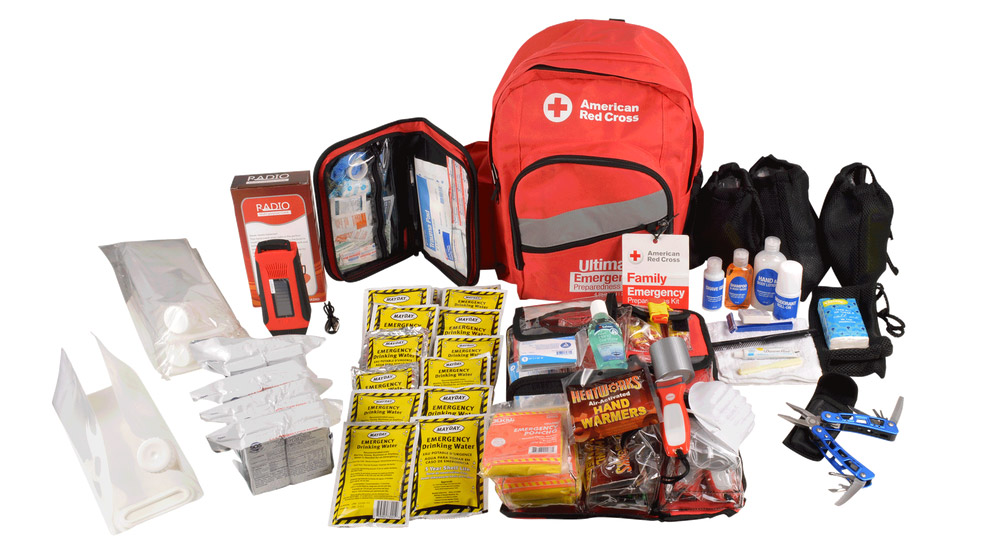Some years, hurricane season is marked by one or two major storms that make headlines across the country. Some years, it's marked by smaller storms that disrupt fewer lives. But every year, the Red Cross encourages residents to be prepared.
"The American Red Cross has been asking and will continue to ask people to be prepared 365 days a year," says Anthony Tornetta, Red Cross spokesman. "There's never a bad day to start getting prepared." The Red Cross responds to more than 60,000 disasters a year, from home fires to wildfires, hurricanes to tornadoes.
A national observance, such as May's Hurricane Preparedness Week (May 3-9), is a reminder that preparing for disasters can make a difference. As the week begins — in the midst of a pandemic that requires additional types of preparation — there are some slight differences to the regular tips the Red Cross offers. Carry a mask with you, for instance, Tornetta says.
Often when a hurricane is coming, meteorologists are tracking it. "So if your preparedness kit is not complete, you have time," Tornetta says. Still, having everything together early can save time and peace of mind, especially during a pandemic, when items you need can be harder to come by.

For tornadoes, there's often little warning and getting to a physical safe space is key. As of the end of April, 73 people in the U.S. had been killed by tornadoes in 2020, according to the National Oceanic and Atmospheric Administration (NOAA). There were 40 deaths in April alone.
For tornadoes, the Red Cross recommends identifying ahead of time a safe space to gather with family, including pets, such as the basement, a storm cellar or an interior room with no windows on the lowest floor of the house. For high-rises, the Red Cross recommends sheltering in an interior hallway. And for mobile homes, the Red Cross recommends seeking shelter in a nearby, sturdy building — if possible.
For all disasters, keep your devices charged, Tornetta says. "That's your link to the outside world and what you need to know to stay safe."
The Red Cross also recommends the following:
- Make sure you have a plan. And make sure you have a copy of important documents — whether printed out or on your phone — that you need to prove your identification.
- Make sure you have cash on hand. During COVID-19, people are using bank and credit cards to avoid touching money. But during a hurricane, power is often disrupted, and cash will be needed. Leave it in your to-go kit.
- Tornetta recommends a gallon of water per person per day you're expected to evacuate or shelter in place.
- Remember not only to keep your devices charged, but to take chargers with you if you evacuate after a hurricane.
- Make sure you have a seven-day to 30-day supply of medication.
- Have nonperishable food items on hand.
- Have cleaning, hygiene and first-aid products on hand. Tornetta says that he realizes some of those items can be difficult to find these days, but keep an eye out, he recommends.
The Red Cross itself is taking precautions. For home fires, the most frequent disaster they respond to, they are putting families in hotels. The same will be true, if possible, in the event of a larger-scale disaster, so that social distancing can be maintained. Whether a disaster effects one family or a whole community, it turns worlds upside down. "We try to bring back some normalcy," Tornetta says.
NeighborWorks network organizations, especially those in places where disasters have hit before, step up to create awareness each year.
In New Orleans, Providence Community Housing (PCH) formed in the wake of Hurricane Katrina to provide affordable housing to displaced individuals. The organization refreshes its plans and makes sure, through property managers, that residents are aware of how to evacuate and what to have on hand in case of a hurricane. Administrators keep contact lists updated and work on remote plans for the staff if they're evacuated and can't be onsite. Having an updated hurricane plan helped the organization respond quickly to the stay-at-home orders that accompanied COVID-19, says Kimberly Hollard, director of Resource Development & External Affairs. "Just having a basic framework to start from helped," she says.
PCH continues to assess residents' needs — food is always an issue — during a time where, instead of leaving their homes, people need to stay in. "Every day we send out to our residents an email with updated information or something new," Hollard says. "Information on local testing sites, how to access stimulus funds, things you can bake at home during this time, [Centers for Disease Control and Prevention] recommendations or what to do if you have transportation needs." In May, she says, the update will include hurricane preparedness.
The important thing, says Maria G. Rodriguez-Collazo, director of housing programs at PathStone Corp. in Puerto Rico, is to have a plan — for individuals and for corporations. "We always try to advise organizations that a plan is something you should invest in. It creates some confidence in the team and with your participants that you know what you're doing. That has been really helpful for us."
For more preparedness tips, visit ready.gov/hurricanes and ready.gov/tornadoes.

